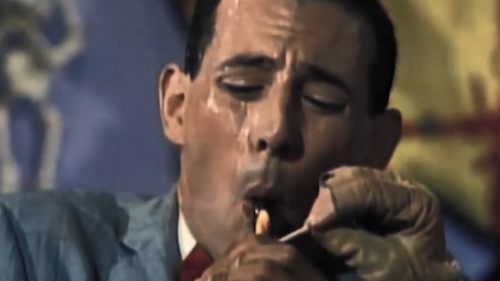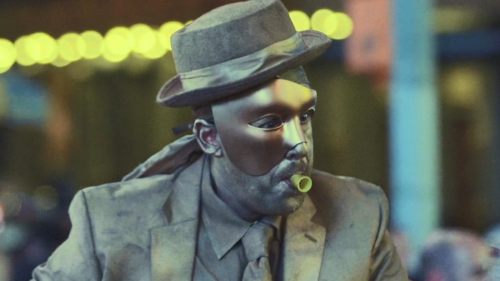WILD-ASS CINEMA WEEK: Josh And Benny Safdie’s HEAVEN KNOWS WHAT
All week long, Birth.Movies.Death. is celebrating the arrival of the Safdie Bros.' Uncut Gems with a series of editorials about some of our favorite Wild-Ass movies. Some of these movies have direct connective tissue to the Safdies' previous films, some are completely unrelated except for their wildness, all are absolutely bonkers and, in our opinion, mandatory viewing. Welcome to Wild-Ass Cinema Week. Get your tickets to see Uncut Gems at the Alamo Drafthouse here.
The three most recent films in Josh and Benny Safdie's filmography read like a series of cinematic escalations – in some ways, that's by design. As the duo shared in our recent interview, their two previous films – Heaven Knows What and Good Time – were practice runs; or, in the vernacular of Howard Ratner, a series of play-offs leading up to the final game: Uncut Gems, a film the brothers spent a decade trying to get made. In that time, they refined their approach to crafting tension and mastered the visceral mechanisms of the thriller genre. The first of the three, 2014's Heaven Knows What, feels almost soothing in comparison to the heart-throttling tension of Gems, but it's also somewhat unfair to weigh one against the other; each film is distinct in tone, with the gritty realism of New York and increasing levels of discomfort the only throughline.
Where Good Time is raw and nerve-rattling (the way you feel the day after inhaling a pile of cocaine), and Uncut Gems is the film equivalent of a panic attack, Heaven Knows What is a quietly unsettling and often off-putting odyssey through addiction, set in the lower street realm of New York – a world willfully overlooked, where lives dramatically enmesh and unfold on park benches and in libraries, in rooms the size of closets with walls and floors obscured by layers of grime, and on littered sidewalks in plain view of the lives they want but that don't want them back. For some, the cinematic rendering of this world may be too aggressively unpleasant and thus emotionally inpenetrable, seemingly at direct odds with the notion of film as a conduit for empathy. Those people have probably never been on intimate terms with addiction. Good for them.
Evoking comparisons to The Panic in Needle Park, the Safdies' 2014 film is the visual memoir of its star, Arielle Holmes, and recounts her life as a homeless heroin addict on the streets of New York. The duo met Holmes in the Diamond District, the setting of their latest film, while she was panhandling. The Safdies were so taken by her story that they encouraged her to write a memoir titled Mad Love in New York City; the contents of that unpublished memoir formed the basis for Heaven Knows What. It begins with Harley (Holmes) offering to kill herself if it would please her boyfriend, Ilya (Caleb Landry Jones, of course), who has discovered that Harley had an affair. "Would you love me if I died?" she asks, and Ilya says he would. Even worse, he antagonizes her about it, bullying her into using a straight razor – one she bought with her scant earnings from panhandling – to slice her wrist open. It's ugly and confrontational and deeply disturbing, and though we should feel a sense of relief when Harley winds up in a psych ward, there is none to be found.
The truth is that addiction is relentless and all-consuming to the point of psychic reincarnation; you are no longer yourself. Instead, there is a writhing id screeching in the void buried deep in the skin that looks like you. The other truth – the one on the sidewalks – is that the world does not care about your troubles, the people on the street cannot look past their own insecurities and comparatively privileged problems, and the healthcare industry is such that it's shockingly easy for anyone to get hooked on opiates and nearly impossible for them to stop – unless they have the resources (read: money, loved ones, community) to do so. And so it's not surprising when Harley returns to the street and into the arms of her addiction, and – eventually – back to Ilya.
Holmes is a revelation, transcending rote addiction narratives and their pandering put-ons. Harley isn't a character, but a deeply personal work of performance art. There is that notion of "gritty realism" in movies, of trying to create a narrative grounded in reality, but few ever achieve such disquieting tangibility; few treat each of our senses like an exposed nerve. Amid the film's many frustrating moments – problems that, to an outsider, might be solved with the coherent speech and rational thinking of a sober person, were it that simple – are breathtaking close-ups of Holmes' face: her big, black eyes like sorrowful pools; the sad, thin eyebrows of a teen circa 2000 (maybe the last time she was herself); the surprising edges of her face and the way the dimensions subtly shift with each tilt of the head. She is a surrealist painting of Shelley Duvall.
While the comparison to The Panic in Needle Park is somewhat apt, the Safdies' style in Heaven Knows What is more evocative of Ingmar Bergman – particularly the way faces and profiles are shot and held too close for comfort, but it's also felt in the improvisational performances from Holmes, Landry Jones, and Buddy Duress. The three films in this informal NY trilogy all have a distinct look and feel that places them among names like Mann, Ferrara, and Toback, but rather than merely deploy a classic style to a modern story, each of these titles have narratives that are relatively timeless (give or take a bejeweled Furby). That is especially true of Heaven Knows What, which captures the reality of addiction by getting up close and uncomfortably personal to it. If you can overcome the obstacle of watching people driven entirely by desperation and the fear of the super-massive, overwhelming unknowns lurking behind the decision to get clean, you'll find a story in which addiction and love are rivaling afflictions, and the woefully shallow limits of our empathy are writ large in big, doe eyes.



